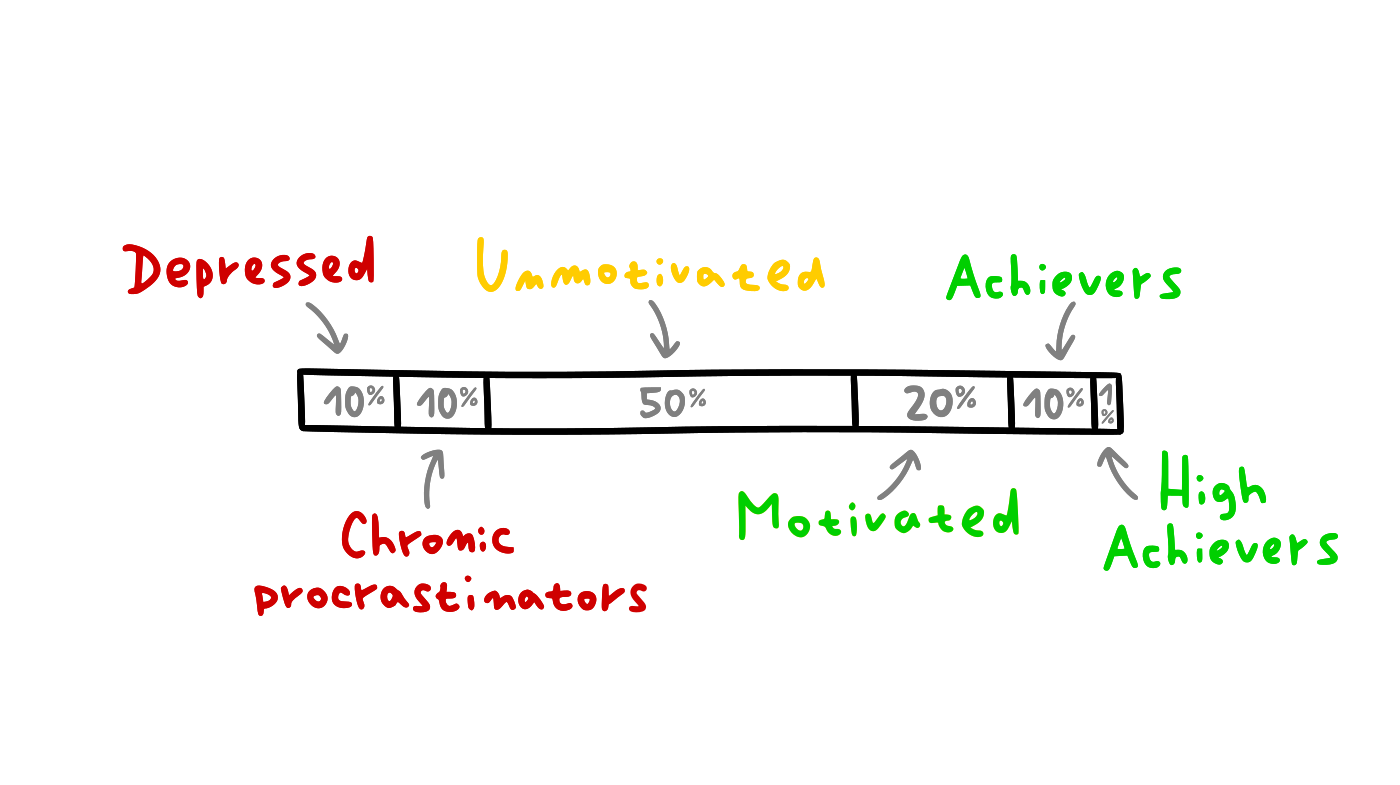Stages of self-development
What if we had a map that could show us where we are in the self-development journey? This could help us find out what we need to focus on right now to improve ourselves. We could identify the bottleneck of our improvement easily. Instead of focusing on thousand small things and failing like most people do, we could find one or two most painful issues, fix these, and then move on to the next stage.
In bodybuilding and strength training, we understand the differences between beginner, intermediate, and advanced athletes. Each level requires a different training regimen.
However, in self-development, no one distinguishes between whether people are beginners, intermediates, or advanced practitioners. This only leads to frustration because people focus on the wrong things at the wrong time.
For example, you read Getting Things Done. You think it’s great. You try it for a couple of days but then you fail. Why? Because the book is meant for intermediates and you’re a beginner. As a beginner, you probably struggle with being consistent and not avoiding work in the first place.
It’s the same as trying to work on little nuances at the bottom of the squat when the trainee has the main issue of not going to the gym regularly. His squat technique can be perfect but if he avoids the gym, it doesn’t matter.
Enter Self-Development Spectrum

We’re all somewhere on this spectrum. No one is statically positioned. We can move on the spectrum every day by our actions.
Here are the stages:
- Depressed
- Chronic Procrastinators
- Unmotivated
- Motivated
- Achievers
- High Achievers
We can count the first 3 stages as beginners. Intermediates are Motivated and Achievers. Advanced are High Achievers.
Beginners
As a beginner what you do is way more important than how you do it. In the first 2 stages, it’s necessary to get out of a rut and start doing something. If you start doing something and get excited about it, you can quite quickly catapult yourself to the Motivated stage, skipping the Unmotivated stage altogether.
Depressed
This is the worst starting position in self-development. We don’t usually begin our journey here but some of us slip here. It can be a very difficult starting position because people often don’t care and don’t have any motivation to do anything. When you’re depressed, you might even assume that only now you think clearly. All the hopes and dreams you had were pathetic. Only now you can see the world as it truly is. This is a frequent perception distortion.
Not all episodes of depression are equal and they differ in severity.
If you’re clinically depressed:
Please get professional help. Some people might be genetically predisposed and that’s why you need all the tools available to get out of this state. Get professional help from a psychiatrist who won’t just give you pills and send you home. If you know someone who might be clinically depressed, please talk to them and try to get them to seek professional help.
Other episodes of depression aren’t that severe and don’t last long. Usually, if you feel down for less than two weeks and you see glimpses of hope here and there, it’s not that serious. Serious depression is when you can’t see any hope in sight.
You might show weak symptoms of being depressed. These are called moods and the good thing is they’re fleeting and can go away fast. Especially, if you help the process by achieving something.
If we were to use the gym metaphor again, the equivalent of the Depressed stage is being obese and spending all one’s time in bed or on the couch. To move forward, the person has to start walking.
What to do
The goal here is to spark any motivation at all. Any motivation to take a step forward, and then another step, and another. That can range from the smallest things like taking care of your hygiene regularly or cleaning your room to bigger things like starting to exercise or work.
The good news is, depending on the strength of your chronic procrastination habit, if you start moving forward, and you start feeling good about it, you can skip the other 2 beginner stages entirely and jump straight to intermediates.
What might help
I just don't care about myself
Why should you even bother improving yourself?
(Not a fan, but it’s a smart message.)
Chronic procrastinators
This is another beginner stage. Most people also don’t start here. However, many people slip here during high-school, college, or a particularly boring or stressful period at work.
We explained chronic procrastination here. Basically, being a chronic procrastinator means that the habit of procrastination is strongly ingrained. Most chronic procrastinators live lives haunted by regret and shame and can't enjoy leisure.
Chronic procrastination for a longer period of time can lead to depression. People in this stage often show symptoms of being depressed because they’re unsatisfied with their lives.
The main difference between chronic procrastinators and depressed people is that chronic procrastinators want to change themselves. They might even have glimmers of temporary motivation to do so. However, most of the time they try, they fail, and dig themselves into an even deeper hole than before.
They usually fail because they take on many things at once, focus on wrong areas, or self-sabotage themselves because they get scared (of responsibility, failure…).
Following the gym analogy, a chronic procrastinator is like a chubby, out-of-shape person that wants to start working out but doesn’t know how. To move forward, the person has to start exercising regularly, no matter how small the feat is (10 pushups per day).
What to do
To get out of this stage, there are the two main goals:
1. Reduce distractions
You have to reduce distractions to have room to work on yourself. Distractions like games can be so captivating that people can always escape and stop thinking about what’s happening in their real life. If you spend 8 hours playing games, it’s hard to make any progress in any area of your life.
2. Start showing up consistently (no matter how small the steps are)
That can mean writing 50 words every day if you’re a writer, studying for 10 minutes every single day if you’re a student, not avoiding the most important responsibility if you’re an employee. It can be whatever you select it to be.
If this works consistently, you can start exploring the reasons why you procrastinate in the first place.
What might help
What is chronic procrastination and how to overcome it
Watch this short talk on how small steps can add up
Unmotivated
Unmotivated people are still beginners, but unlike chronic procrastinators they appear to function normally on the outside. By unmotivated, we mean lacking internal motivation. People here function by getting motivated externally (getting a diploma, getting a salary, etc). They do things because they have to.
This is the stage where most people spend the majority of their lives.
Unmotivated people sometimes stumble upon glimpses of internal motivation. For example, when they start a new hobby or a new project they get excited about it. However, their habits usually aren’t strong enough to sustain the initial motivation and without a positive feedback loop, they fall back into their old unproductive ways. Due to these reasons, their motivation is temporary and dissipates after the initial excitement fades.
Unmotivated people often struggle with procrastination in all forms. They resent work most of the time and feel like they HAVE TO do this and that.
In gym terms, this is a person who “has” to go to the gym because someone told them it’s good for them, but they don’t have any positive feelings towards exercising. It’s a chore for them. If the person wants to move forward, the goal is to go to the gym regularly and slowly start liking it. That might entail finding physical activities that they enjoy.
What to do
In the Unmotivated stage, there are 3 main goals:
1. Reduce distractions
Similar to chronic procrastinators, an unmotivated person needs to cut distractions. Distractions can serve as an easy form of escapism that let people forget about their own lives. This is often the reason why people spend their lives in the unmotivated stage. They kill all their waking time by being distracted, which doesn’t let them think about how their life is going. Don’t believe us? Go sit in your room staring at a wall in silence for an hour not doing anything.
You will get bored quickly and will want to do something like grab your phone or stand up and go somewhere. Anything to escape looking inward and grappling with the issues on your mind.
People simply hate getting bored. When you reduce distractions, you will feel uncomfortable and want to do something. The key is to change the meaning of something from getting distracted to improving yourself (in any way you can manage). If you reduce and block distractions, this will become easier because now the choices are to be bored or do something productive, instead of to get distracted or do something productive. If you want to know more about this, check out this blog post.
2. Find your internal motivation
If you want to get motivated for the long term, you want to find ways to rely on internal motivation. That means finding personal reasons why you want to improve.
It also means that you want to discover or create a positive feedback loop. What’s that? It’s when you feel satisfied after working hard and you can clearly see the connection between your effort and how it impacts your life.
For more on finding motivation, read this short article.
3. Establish regular working habits
Showing up consistently is something that will make your progress almost guaranteed. Once you do this, the work usually becomes more exciting because you start making visible progress.
In this stage, you need to learn how to start and how to start often. That also means resolving your fears and insecurities. You can still live with them but resolving these will make starting and working easier.
You also need to learn to enjoy deserved leisure so you don’t have to fear infinite dreary work.
Another part of establishing regular working habits is using a calendar on a regular basis and planning your days. These behaviors aren’t viable in the previous stages, because people usually stop looking at their calendar to avoid responsibilities or don’t follow the plans for the day. But once you’re in this stage, you know that to be a responsible person, you need some form of reminders to actually accomplish things on a consistent basis.
What might help
Fear of infinite workRead our guide
Intermediates
Intermediates start to stumble upon a new problem. For beginners, the main problem is doing things they planned or set out to do. Intermediates don’t struggle with doing things most of the time and they’re better at starting, resolving fears, and not giving in to instant gratification. Instead, they struggle with the issue of how to do more or work more effectively in general.
Motivated
People at this stage have already discovered a positive feedback loop that fuels their internal motivation. They don’t dread work like people at the stages before. They understand that difficult tasks have to be done to succeed. They also like how good it feels to be disciplined. This is not to say they’re successful all the time, but people here are much better at saying no to immediate gratification.
In gym terms, these are talented athletes. They’re showing a lot of potential but plenty of work awaits them to reach full potential. To get more out of their training, they need to start focusing on the little details.
What to do
1. Create or maintain a positive feedback loop
The main goal here is to get addicted to the positive feedback loop work brings you. You already know how satisfying it is when you start achieving things. You can more easily reject instant gratification because you know making progress feels better. Setting goals and tracking them helps maintain the positive feedback loop.
2. Start working on how you do things
You know you can achieve plenty of things, but to be able to do them you need external help. You take on too much and want to build your ability to rely on yourself. That’s where things like the GTD system start making sense.
Motivated people can start playing with productivity systems. They have enough self-confidence to use them consistently enough to be able to compare and see the differences. They start to see why all the weekly reviewing, goal planning, and note taking aren’t a waste of time.
What might help
Read GTD or any methodology that will suit you to have a mind like water.
Be sure to check out Forte Labs
Achievers
At this stage, people don’t struggle with what they do. They know how to begin, how to divide a large task into smaller subtasks they can complete, and they can successfully overcome fear most of the time. If they have fears, stress, and anxiety they acknowledge them but they don’t act on them. They very rarely choose something that isn’t in their best interests. They know that the long term choice will bring them more happiness through delayed gratification.
This stage becomes fun because people get excited about what they do and about the future possibilities.
For achievers, the bottleneck of productivity is how they do things. They have reached the upper limits of what they can do with the current methods they’ve adopted or come up with. To expand their horizons further, they need to start looking for outside methodologies to boost their productivity. When they start optimizing things, it can appear to onlookers that these people are wackos. The reality is, they’re showing up every day and want to get more out of every second of their time and energy.
However, these people can still struggle with self-confidence. This is called imposter syndrome. They’re good at what they do, but don’t they know they're good. Many achievers underestimate how effective they are compared to other people and can feel insecure about their abilities and efforts.
In gym terms, this person is an amateur competitor who always places in the top 3. If he keeps doing what he is doing, he might become a professional.
What to do
1. Find new methodologies and study the nuances
Now you can properly test GTD, personal knowledge management, and note-taking. Not that you can’t function without these, but you should see the reasons why these methodologies allow you to do more.
Try out these external productivity systems or various tips you find to see which methods work best for you and allow you to do more than you otherwise would.
What might help
Read GTD or any methodology that will suit you to have a mind like water.
Be sure to check out Forte Labs
Advanced
If you’re here, congrats! You’re the 1%. You probably live a satisfying life.
High Achievers
This stage is what internal motivation can lead to. High achievers appear to other people like gods of discipline. But they aren’t. They just established really good working habits and love the satisfaction their work brings them. They really enjoy what they do and might say they’re following their passion. When high achievers focus on something, they get great at it.
The main difference between high achievers and achievers is that they’ve been doing it for longer. High achievers have true self-confidence. They know what they stand for and can achieve anything they set out to do because they’ve proved it many times to themselves and to others. Often this self-confidence is demonstrated by their humility and quiet certitude about their abilities.
In gym terms, this person is a pro competitor.
What to do
1. Double down
You can usually double down on knowledge management and note-taking. You benefit the most from these because it fuels your curiosity even more. If you feel you have any gaps there, be sure to check out Forte Labs. Or maybe read this.
2. Experiment
Based on your knowledge of what you’re good at and how you operate, try out new techniques or variations of someone else’s methods. Experiment and find what fits into your productivity system and what doesn’t.
3. Prioritize, focus on high impact activities, delegate
If you get to the high achiever level, it becomes crucial to focus on the most important activities first. You can focus often and intensely, but if you focus on the wrong things, you’ll limit yourself. Start here.
At this stage, it also makes sense to hire others to do less important busywork.
That’s it. While reading, you probably found the stage you’re currently at.
- Depressed
- Chronic Procrastinators
- Unmotivated
- Motivated
- Achievers
- High Achievers
You can now identify more easily what to focus on to improve yourself.
- Think about which stage you’re currently at
- Figure out what your path to becoming better is (don’t overthink it - you can always come back to this step - no worries)
- Take a look at at least one resource related to your stage
- Start working on it - set a goal, take a tiny step, just start,...
Use this framework to improve your life today.


